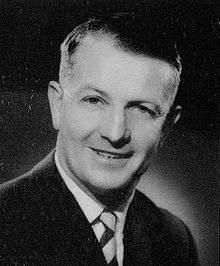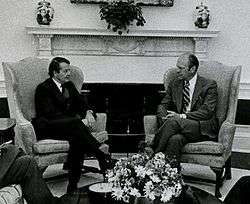Bill Rowling
| The Right Honourable Sir Wallace Rowling KCMG | |
|---|---|
 | |
| 30th Prime Minister of New Zealand | |
|
In office 6 September 1974 – 12 December 1975 | |
| Monarch | Elizabeth II |
| Governor-General | Denis Blundell |
| Deputy | Bob Tizard |
| Preceded by | Norman Kirk |
| Succeeded by | Robert Muldoon |
| 33rd Minister of Finance | |
|
In office 8 December 1972 – 6 September 1974 | |
| Prime Minister | Norman Kirk |
| Preceded by | Robert Muldoon |
| Succeeded by | Bob Tizard |
| 22nd Leader of the Opposition | |
|
In office 12 December 1975 – 3 February 1983 | |
| Preceded by | Robert Muldoon |
| Succeeded by | David Lange |
| 8th Leader of the Labour Party | |
|
In office 6 September 1974 – 3 February 1983 | |
| Deputy | Bob Tizard |
| Preceded by | Norman Kirk |
| Succeeded by | David Lange |
| 22nd President of the Labour Party | |
|
In office 1970–1972 | |
| Preceded by | Norman Douglas |
| Succeeded by | Charles Bennett |
| Member of the New Zealand Parliament for Buller | |
|
In office 1962–1972 | |
| Preceded by | Jerry Skinner |
| Member of the New Zealand Parliament for Tasman | |
|
In office 1972–1984 | |
| Succeeded by | Ken Shirley |
| Personal details | |
| Born |
15 November 1927 Motueka, Tasman District, New Zealand |
| Died |
31 October 1995 (aged 67) Nelson, New Zealand |
| Political party | Labour |
| Spouse(s) | Glen Elna Reeves (m.1951) |
| Children | 5 |
| Alma mater | University of Canterbury |
| Religion | Anglican[1] |
| Military service | |
| Allegiance | New Zealand Army |
| Rank |
|
| Battles/wars | Malayan Emergency |
Sir Wallace Edward Rowling KCMG PC (15 November 1927 – 31 October 1995), often known as Bill Rowling, was the 30th Prime Minister of New Zealand. He was in office for just over a year, having been appointed Prime Minister following the death of the highly popular Norman Kirk. Rowling was unable to retain the premiership but remained leader of the Labour Party until 1983.
Early life
Rowling was born in a country suburb of Mariri neighbouring the town of Motueka, near Nelson. He was a member of a long-established farming family. He was educated at Nelson College and the University of Canterbury, gaining a degree in economics. He also attended the Christchurch College of Education (currently, University of Canterbury), qualifying as a teacher. After completing his education, Rowling taught at several schools around the country, including at Motueka, Christchurch, Waverley and in Northland. In 1958, Rowling left teaching and joined the New Zealand Army, becoming Assistant Director of Army Education. He spent a short amount of time serving abroad in Malaysia and Singapore, a deployment connected with the Malayan Emergency.[1]
Member of Parliament
| Parliament of New Zealand | ||||
| Years | Term | Electorate | Party | |
| 1962–1963 | 33rd | Buller | Labour | |
| 1963–1966 | 34th | Buller | Labour | |
| 1966–1969 | 35th | Buller | Labour | |
| 1969–1972 | 36th | Buller | Labour | |
| 1972–1975 | 37th | Tasman | Labour | |
| 1975–1978 | 38th | Tasman | Labour | |
| 1978–1981 | 39th | Tasman | Labour | |
| 1981–1984 | 40th | Tasman | Labour | |
In the 1960 election, Rowling was selected as the Labour Party's candidate for the Fendalton electorate in Christchurch. Fendalton was regarded as a safe National seat, and Rowling was defeated by the National Party's Harry Lake (who was appointed Minister of Finance in the new National government). Two years later, however, Rowling successfully contested the by-election for Buller, which had been caused by the death of prominent Labour MP Jerry Skinner. Rowling was to hold this seat until the election of 1972, when the seat was dissolved – Rowling then contested successfully the new seat of Tasman, which intriguingly he did travelling up and down the electorate by Commer campervan, which he lived in for the time.
When the Labour Party won power under Norman Kirk in the 1972 election, Rowling was appointed Minister of Finance. This could be seen as a considerable promotion for someone without prior ministerial experience. Rowling's term as Minister of Finance was somewhat turbulent, with a number of formidable economic challenges arising during his tenure.
Prime Minister

When Norman Kirk died unexpectedly in 1974, Hugh Watt, served as acting prime minister for several days while the Labour Party chose a new leader. Rowling, was the front-runner to replace Kirk, However, the party National Executive and the Federation of Labour preferred Kirk's deputy Hugh Watt.[2]
Rowling was officially confirmed as party leader and 30th Prime Minister on 6 September 1974[3] taking the role of Minister of Finance[4] He had the option of replacing Kirk in the safe Labour seat of Sydenham[5] but chose to remain in his (more marginal) home electorate of Tasman.
He was later appointed to the Privy Council.[6] Unlike the pro-life Kirk and Muldoon, Rowling was pro-choice.
As leader, Rowling was attacked by the opposition led by Robert Muldoon, and was generally characterised as being weak. His supporters denied this, saying he chose not to participate in the confrontational and aggressive politics that Muldoon favoured.
Leader of the Opposition
The 1975 election was a major defeat for the Labour Party. Labour also campaigned with the famous Citizens for Rowling – prominent New Zealanders who backed Rowling. The campaign was labelled as being elitist, and was generally regarded as having backfired on Rowling.[7]
During the late 1970s, Rowling alienated Maori by removing Matiu Rata, the party's effective and well-regarded Maori Affairs spokesman, from the Opposition front bench. Earlier, Rowling had replaced Rata with himself as convenor of Labour's Maori Affairs Committee. Mat Rata complained about the insensitivity of Labour's Maori policy[7] and went on to form his own party, Mana Motuhake, a precursor to the Māori Party.
His approach to the Moyle and O'Brien 'affairs' was regarded as heavy-handed and unnecessary in many circles. In regards to the 'Moyle affair', "it was Rowling who insisted that his close friend, Colin Moyle, must resign".[7] Large numbers protested at the 1977 Labour Party Conference; many in the LGBT community never forgave him.[8]
Rowling, however, managed to retain the party leadership, and gradually managed to improve public perceptions of him. In the 1978 and 1981 elections, Labour actually secured more votes than the National Party but failed to gain a majority of seats.
While Rowling had largely managed to undo his negative image, many people in the Labour Party nevertheless believed that it was time for a change. In 1983 Rowling was replaced as leader by the charismatic David Lange, who went on to defeat Muldoon in the 1984 election. Rowling retired from parliament at the same election.
Later life
After leaving politics, Rowling was appointed Ambassador to the United States, serving from 1985 to 1988. He held that position when the issue of nuclear weapons and ANZUS flared up between the United States and New Zealand, and he travelled extensively across the country explaining the policy.[9]
Later, after returning to New Zealand, Rowling became highly involved in a number of community organizations and trusts. He also played a prominent role at the Museum of New Zealand, and is considered to have been the "driving force" behind the eventual establishment of Te Papa.[1]
Honours
Honours that Rowling received include being made a Knight Commander of the Order of St Michael and St George in the 1983 Queen's Birthday Honours,[10] an honorary law doctorate from the University of Canterbury in 1987,[11] and being made a Commander in the Orde van Oranje – Nassau (Netherlands).[9]
Death
Rowling died of cancer in Nelson on 31 October 1995.[9]
References
| Wikimedia Commons has media related to Bill Rowling. |
- 1 2 3 Henderson, John. "Rowling, Wallace Edward". Dictionary of New Zealand Biography. Ministry for Culture and Heritage. Retrieved 23 February 2013.
- ↑ Auckland Star 5 September 1974 p11
- ↑ "Prime Minister Appointed" (6 September 1974) 87 New Zealand Gazette 1899.
- ↑ "Ministers Appointed" (10 September 1974) 88 New Zealand Gazette 1901.
- ↑ Grant, David (2014). The Mighty Totara: The life and times of Norman Kirk. Auckland: Random House. ISBN 9781775535799.p420
- ↑ "Special Honours List" (26 September 1974) 93 New Zealand Gazette 2047.
- 1 2 3 Rowling: The man and the myth by John Henderson, Australia New Zealand Press, 1980.
- ↑ see Henderson, p. 167 for more on Gerald O'Brien and the O'Brien 'affair'
- 1 2 3 OBITUARY: Sir Wallace Rowling, The Independent, 1 November 1995.
- ↑ The London Gazette: (Supplement) no. 49376. p. 33. 11 June 1983. Retrieved 20 June 2015.
- ↑ "Honorary Graduates" (PDF). University of Canterbury. p. 1. Retrieved 20 June 2015.
| New Zealand Parliament | ||
|---|---|---|
| Preceded by Jerry Skinner |
Member of Parliament for Buller 1962–1972 |
Constituency abolished |
| New constituency | Member of Parliament for Tasman 1972–1984 |
Succeeded by Ken Shirley |
| Political offices | ||
| Preceded by Norman Kirk |
Prime Minister of New Zealand 1974–1975 |
Succeeded by Robert Muldoon |
| Preceded by Robert Muldoon |
Minister of Finance 1972–1974 |
Succeeded by Bob Tizard |
| Leader of the Opposition 1975–1982 |
Succeeded by David Lange | |
| Party political offices | ||
| Preceded by Norman Douglas |
President of the Labour Party 1969–1972 |
Succeeded by Charles Bennett |
| Preceded by Norman Kirk |
Leader of the Labour Party 1974–1983 |
Succeeded by David Lange |
| Diplomatic posts | ||
| Preceded by Lance Adams-Schneider |
Ambassador to the United States 1985–1988 |
Succeeded by Tim Francis |